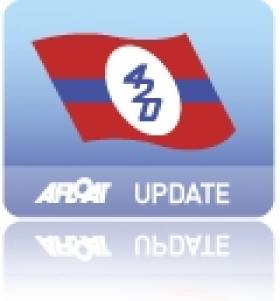Displaying items by tag: e book
420 Class Launch e-Book for Learning Dinghy Skills
#420 – The International 420 Class has launched the Exercise e-Book, a new online training resource targeted at providing world class training techniques and strategies on Performance Improvement for Coaches and Sailors.
The new International 420 Class Association Exercise e-Book provides a selection of carefully chosen performance training exercises, with accompanying video and commentary to provide sailors and coaches with a step by step path to improving their skills. From covering boat set-up to techniques at mark roundings, strategies and tactics on the startline to gybing in strong winds, the e-Book covers a diverse range of training exercises. The International 420 Class Association Exercise e-Book is provided free of charge to 420 sailors and coaches around the world.
The International 420 Class Association recognizes the valuable role coaches play in sailors' development and wants to provide equal opportunity to coaches around the world to access training techniques and improve their own skills. The e-Book provides a clear explanation of the purpose of the training technique, details of equipment required and guidance on how to evaluate performances for sailors of all abilities, as well as sections including boat preparation and setting up a 420. The video and animation break down the manoeuvres into easily digestible chunks. Additional advice, tips and debrief notes provide maximum guidance and best methods of benchmarking sailors' progress.
Reigning Olympic Gold medallist in the 470 Class and five-time 470 World Champion Mat Belcher thoroughly endorses the initiative. Australia's Belcher won the 420 World Championships in the year 2000, with his brother Daniel, and claimed a silver medal with his now wife Rike Belcher in 2004.
Belcher commented, "To help reduce the skills gap and make the sport more accessible to all must be one of our collective goals. I really applaud the initiative of the International 420 Class to launch this innovative training programme. Even for those sailors without a coach, they can read the e-Book and watch the videos and develop their own training programmes. This is a really fantastic resource."
Packed with imaginative training techniques, the e-Book will prove to be an invaluable resource for coaches and sailors. The range of exercises covers Basic, Racing and Advanced level sailors. The e-Book includes warm-up exercises, training exercises, boat handling and manoeuvre exercises.
Coming together with other sailors and a coach to train is a great experience, but the online resource will also help those who are training individually and unable to regularly work with a coach.
Nino Shmueli, International 420 Class Association President said, "The 420 Class' objective is to facilitate equal opportunity for access to training resources for 420 sailors and coaches around the world. We are fortunate to have developed the e-Book with renowned coach Nikos Drougkas, who is a regarded and inspirational coach to many. The 420 Class wants to revolutionize the availability of expert knowledge and make it available free of charge through the imaginative use of online platforms. Whilst developed by the 420 Class, the training resource is relevant for all dinghy and small boat sailors."
The International 420 Class Association Exercise e-Book is the second online training resource developed by the International 420 Class Association. In 2011, the 420 Class launched 420 to the Max, a range of free online videos introducing training techniques, for beginners and experienced sailors. Clear direction and guidance demonstrates how to master techniques in different wind and sea conditions and what to consider when undertaking manoeuvres. Available in English, French, German, Spanish and Japanese, the 420 to the Max videos have attracted in excess of 200,000 views – clear evidence of the worldwide appetite for online training.






























































